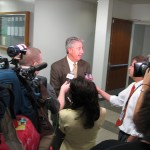
City Council President Arnie Fielkow takes questions at a Press conference hosted by Levees.org in May 2008
After all, Fielkow had just sponsored a resolution in New Orleans (written by Levees.org) urging all local media to stop using Katrina ‘shorthand’; that is, to stop saying that a ‘natural disaster’ flooded the city.
We just got the language of the presentation and we are pleased.
Fielkow and Cowen had five central points to make and the first, the very first was Katrina exposed flaws – crumbling federally-built levees…
Levees.org is pleased because the exposure by Katrina of poorly built levees – and how the Army Corps of Engineers was responsible for them – is probably the MOST important yet LEAST understood fact about the tragedy of the metro New Orleans flooding.
New Orleans thanks you Council President Fielkow and Tulane President Cowen.
Below is a reprint of a Cowen’s letter sent to the students, faculty and alumi of Tulane University
December 4, 2009
Good Morning:
Yesterday, City Council President Arnie Fielkow and I presented “Five Things You Should Know About New Orleans” to the National Press Club in Washington, D.C. We wanted to send the national media a different kind of message regarding New Orleans.
Our main points were:
1. The tragedy of Hurricane Katrina will result in New Orleans being a better and stronger city in the future.
Katrina exposed flaws – crumbling federally-built levees, a government unprepared, poverty and other signs of a community that had failed its youth. But this tragedy also awakened citizens to the need for change.
2. As a result of Katrina, New Orleans can serve as a demonstration lab for disaster recovery and transformation.
We now know how to plan for and respond to emergencies. We know the value of public/private partnerships that are revolutionizing our school system and establishing community health centers to provide medical care for the uninsured. We know how to recover our economy and even how to deal with FEMA.
3. Our recovery is a superb example of civic activism and resiliency.
Citizens voted out a wasteful system of seven tax assessors and multiple parish levee boards. They demanded funding for an inspector general to root out corruption and they banded together to demand effective and accountable government.
4. New Orleans is an iconoclastic city, which has retained its distinctiveness and charm despite the challenges and hardships it has and does face.
There are now more restaurants in New Orleans than before Katrina. We ranked first in more categories in Travel + Leisure Magazine’s 2009 “America’s Favorite Cities” survey than any other city. We are a hotbed of entrepreneurship and the quintessential sports town – hosting the Super Bowl in 2013 and the men’s and women’s NCAA Final Four basketball championships in 2012 and 2013. Not to mention our undefeated Saints.
5. New Orleans has the potential to become a model city for the 21st century.
Great things are in store for New Orleans. We have gotten a taste of positive change. We want more and we aspire to be a model for the country.
I was honored to share our city’s message on a national stage. I hope you, too, will share these five things with everyone you encounter, especially out-of-town friends and family. Together, we can make the story of New Orleans known far and wide.
Have a great weekend,





Leave a Reply